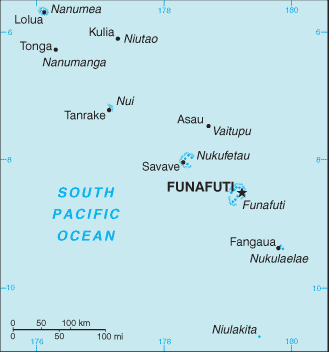Tuvalu, Climate Change and the Metaverse

All Global Research articles can be read in 51 languages by activating the Translate Website button below the author’s name.
To receive Global Research’s Daily Newsletter (selected articles), click here.
Follow us on Instagram and Twitter and subscribe to our Telegram Channel. Feel free to repost and share widely Global Research articles.
***
When lost to climatic disaster and environmental turbulence, where does a whole nation go? History speaks about movements of people, whether induced by human agency or environment, finding sanctuary and refuge on other terrains, or perishing altogether.
In the case of the Pacific Island state of Tuvalu, the response is seemingly digital or, as its officials prefer to call it, creating the Digital Nation. This particular entity, according to its government, will operate in the increasingly fashionable idea of the metaverse, a 3D virtual space marked by avatars of ourselves roaming through immersive experiences.
This does not sound particularly useful for flesh and blood refugees fleeing the flood, but this is partly the point, moving beyond the finite issues of territory and statehood. And it has given Tuvalu a moral pretext to scold wealthy countries lax about climate change. In the emphatic words of Tuvalu Minister of Justice, Communication and Foreign Affairs Simon Kofe, “As our land appears, we have no choice but to become the world’s first digital nation. Our land, our ocean, our culture are the most precious assets of our people. And to keep them safe from harm, no matter what happens in the physical world, we’ll move them to the cloud.”
The minister’s address was delivered from the digital twin of the Te Afualiku islet. And he has dramatic form, having delivered an address to attendees of COP26 standing knee-deep in the sea.

Tuvalu is by no means the first out of the blocks on this one. The Caribbean island nation of Barbados and the South Korean capital, Seoul, have both ambitions to provide consular and administrative services from the metaverse.
In November 2021, the Barbadian Ministry of Foreign Affairs and Foreign Trade signed an agreement with Decentraland, with a view of finalising agreements with other Metaverse platforms such as Somnium Space and Superworld. The range of contemplated are various: how digital land will be purposed to house the relevant virtual embassies and consulates; how e-visas will be granted; and the construction of teleporters enabling users to move their avatars through the metaverse. The appeal of the program to the ministry was one of numerical reach with minimal logistical problems: why stop at the 18 embassies and consulates now when you could have a base in 190 or so countries?
This year, the Seoul Metropolitan Government, after its November 2021 announcement about moving some of its functions into the metaverse, released a beta version of its “virtual municipal world” touted as Metaverse Seoul. As Cities Today reports, the city “aims to have a metaverse environment for all administrative services, including economy, culture, and tourism” in place by 2026.
Addressing the legal context of a submerged state will raise novel problems. The issue is very much at the forefront of Kofe’s mind. What is one to do with maritime boundaries and the resources located within the relevant waters, notwithstanding inundation? And that’s just the start of it.
This issue has already preoccupied a number of legal authorities and bodies. In November 2012, the International Law Association (ILA) established the Committee on International Law and Sea Level Rise to study the possible impacts of rising sea levels and its “implications under international law of the partial and complete inundation of state territory, or depopulation thereof, in particularly of small island and low-lying states”. The second part to the Committee’s mandate is to develop proposals to develop international law regarding such losses of territory, the impact on maritime zones “including the impacts on statehood, nationality and human rights.”
The implications of such losses are clear enough. Should the loss of a state to inundation and submergence also result in a loss of citizenship? The risk of statelessness is genuine enough, and it remains a source of much debate whether treaty law or international customary law is capable of addressing the issue. As legal scholar Marija Dobrić concludes in a 2019 study, “it is unclear whether the people affected may be considered ‘stateless people’ within the meaning of the Conventions on Statelessness and, even if they did, how far that would serve to protect their rights effectively.”
Transferring the actual, tangible world to the metaverse with all its official and legal implications will induce a number of headaches. This near mystical transition to the ether of the virtual world sounds remarkable and, on some level, dangerously misguided. It relocates one set of challenges for another. Issues of privacy (yes, where did that go?), moderating what content goes into such a model, and how people are to conduct themselves, are pressing points that are simply not being addressed seriously.
Works such as Matthew Ball’s The Metaverse: And How It Will Revolutionize Everything, do little to clear this up, focusing on something approximating to religious dogma. As one reviewer accurately puts it, the work not only minimises the importance of ethical, political and legal issues but also fails to address “how to construct the metaverse responsibly.”
The problems of the metaverse, insofar as they are being articulated, are in their infancy. But we have seen that architects of that scheme, including such manipulative luminaries as Mark Zuckerberg, suggest that a degree of healthy suspicion is required. The response from Tuvalu’s politicians is, on some level, understandable: they made me do it.
*
Note to readers: Please click the share buttons above. Follow us on Instagram and Twitter and subscribe to our Telegram Channel. Feel free to repost and share widely Global Research articles.
Dr. Binoy Kampmark was a Commonwealth Scholar at Selwyn College, Cambridge. He currently lectures at RMIT University. He is a regular contributor to Global Research and Asia-Pacific Research. Email: [email protected]
Featured image is from Ars Technica

